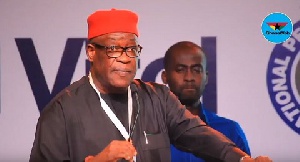The Department of Petroleum resources in Nigeria has pledged support towards achieving the harmonization of standards in the petroleum sector in Ghana and the West African sub-region on the whole.
This forms part of efforts to achieve clean fuels and improve the quality of fuel in the country through the reduction of sulphur content and fuel pollution in the sector.
Speaking at the 2nd edition of the Ghana International Petroleum Conference in Accra Thursday June 8, Head of Products, Depots and Jetties at the Department of Petroleum resources in Nigeria, Jerome Udegbunam reiterated Nigeria’s commitment to ensuring that products discharged into neighbouring countries including Ghana meet the required specifications and are void of any sort of contamination.
According to him, it is important that such products which have the tendency to affect health and lives of individuals in these countries are regulated, monitored and subsequently importers of such products sanctioned if the products fall beneath the set standards.
“Nigeria as at 2017 consumes about 32 million liters of pms on daily basis, it has risen to 50 million litres per day and Contamination of petroleum products and weak regulatory standards particularly in the West African region has among other things had negative impact on the health of citizens and reduced the ability of the country to compete with other industry players in the sector”
“If it is below specification in Nigeria and is affecting Nigerian citizens health-wise, it’s also going to affect other countries in West Africa and therefore, the need for this harmonization cannot be overemphasized because it’s going to be to the benefit of every one of us and so Nigeria as a nation is ready to collaborate with other countries in West Africa to achieve this laudable objective”.
He also among other things, lauded the government of Ghana for pursuing the vision of refining its petroleum products and making the country a petroleum hub for the West African region.
“We congratulate the government of Ghana and the people of Ghana for this initiative and we are assuring you that Nigeria will collaborate as much as possible to make this a success”.
Deputy Energy Minister, Dr. Mohammed Amin Adam on his part emphasized the role of political will in achieving harmonized standards across the sub-region.
“We are talking about an investment requirement of about 200 million dollars for which we have to stagger and wait against the health cost of your people around 600-700 million dollars every year, you’ll have to take a critical decision and not be slow about some of these decisions, so the political will is important. You look across the region and there’s no uniform standard anywhere, the standards differ from country to country….the political will is extremely important”.
The 2nd edition of the Ghana International Petroleum Conference came off Thursday June 8 at the Gold Coast City Hotel in Accra.
The conference aimed at assembling relevant stakeholders in the petroleum industry to discuss a range of critical issues geared towards improving the standard of petroleum products in West Africa and Ghana.
Topics discussed at the program included; “Realizing the vision of a Petroleum Hub”, “Finding the optimal balance between foreign direct investments and local participation in the Petroleum Hub”, and “To refine or not to refine? The case for West Africa”, Funding the vision of a Petroleum Hub”, “Harmonizing West African Standards” and “Achieving public safety at petroleum facilities”.
Vice President Dr. Mahamudu Bawumia and other pertinent key players in the industry were present at the conference.
Business News of Saturday, 9 June 2018
Source: www.ghanaweb.com

















